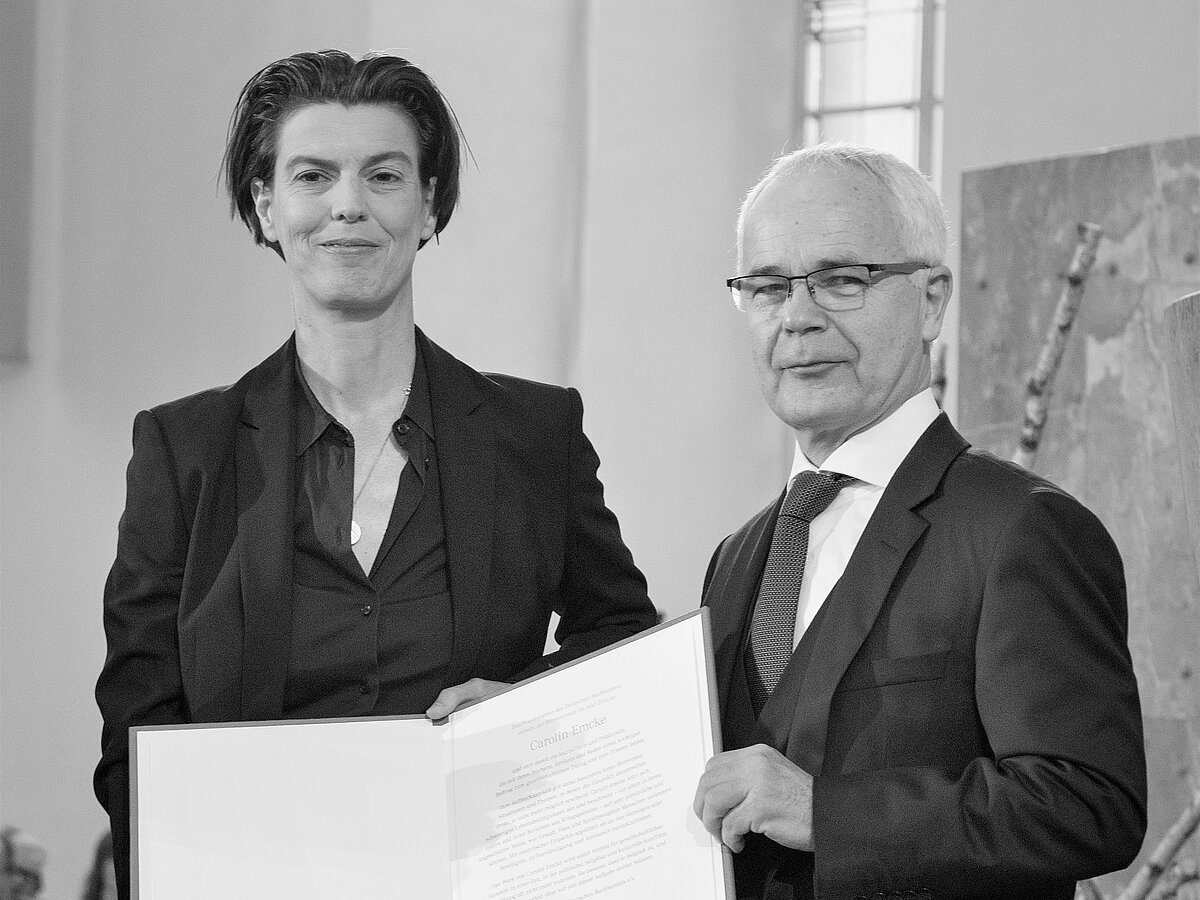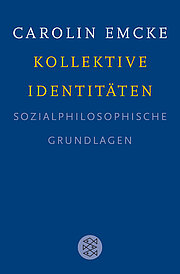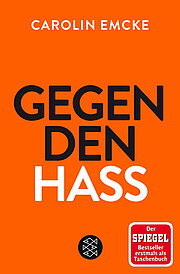The Board of Trustees of the Peace Prize of the German Book Trade has chosen the German journalist and author Carolin Emcke to be the recipient of this year’s Peace Prize. The award ceremony took place on Sunday, 23rd October 2016, at the Church of Saint Paul in Frankfurt. The laudatory speech was held by Seyla Benhabib.
Statement of the Jury
The German Publishers and Booksellers Association awards the 2016 Peace Prize of the German Book Trade to Carolin Emcke. In doing so, the association and its members have chosen to honour a journalist and author whose books, articles and speeches have made a significant contribution to social dialogue and peace.
The work of Carolin Emcke pays particular attention to those moments, situations and issues in which discussions threaten to break down and communication seems no longer possible. In her highly personal and vulnerable manner, she regularly places herself in perilous living situations in order to illustrate – especially in her essays and reports from war zones – how violence, hatred and speechlessness can change people. She then uses analytical empathy to call on everyone involved to find their way back to understanding and exchange.
Carolin Emcke’s work has thus become a role model for social conduct and action in an era in which political, religious and cultural conflicts often leave no room for dialogue. She proves that communication is indeed possible, and her work reminds us that we must all strive to achieve this goal as well.
The Award Ceremony

Speeches
Carolin Emcke makes it clear to us that there is a connection between violence and speech, between violence and voicelessness.
Heinrich Riethmüller - Greeting
Heinrich Riethmüller
Greeting of the president
Throughout her work, Emcke resists this impoverishment of experience through the silences that surround it; she rejects the speechlessness that is inflicted on those who have been tortured, maimed, beaten, and raped by those in power or by those who hide their own impotence through the pretense of having or being in power.
Seyla Benhabib - Laudation for Carolin Emcke
Seyla Benhabib
Laudation for Carolin Emcke
Freedom is not something one owns; instead it is something one does.
Carolin Emcke - Acceptance speech
Carolin Emcke
Acceptance speech
Chronicle of the Year 2016
+ + + The WHO declares an international health emergency due to the rapid spread of the Zika virus + + + During the transfer of migrants on the Mediterranean Sea off Egypt, a trawler capsizes and about 500 people drown. + + + A major earthquake occurs in western Ecuador, killing more than 650 people. + + + Three terrorist attacks kill more than 30 people in and near the Belgian capital Brussels. + + + 49 people are killed in a night club in Orlando (Florida) as a result of a terrorist attack with hostage-taking + + +
+ + + In a referendum on the United Kingdom's remaining in the European Union, 51.9% of Britons decide to leave the European Union. + + + 86 people are killed in a deliberate drive through a crowd of people in Nice in south-east France on the French national holiday. + + + In Turkey, an attempted coup d'état by parts of the military fails, killing more than 290 people, mostly civilians, according to official figures. As a result, there is extensive repression by government forces in numerous parts of society. + + + An attack on the Munich Olympic Shopping Centre causes the deaths of nine people and the perpetrator himself. + + + Hurricane Matthew kills over 1000 people in Central America. + + + Presidential election in the United States. The Republican Donald Trump receives 302 electoral votes and becomes the 45th US President on January 20, 2017. + + + 12 people are killed and more than 50 injured in an attack on a Christmas market in Berlin. + + +
Biography of Carolin Emcke
Carolin Emcke was born on August 18th, 1967 in Mülheim an der Ruhr. Today she lives and works as an independent journalist in Berlin. In 1987, she began studying philosophy, politics and history in London and Frankfurt am Main, where she went on to receive her Magister Artium in philosophy under Jürgen Habermas in 1993. After that, she studied under Axel Honneth in Frankfurt and Seyla Benhabib at Harvard University and completed her doctoral thesis on the topic of »Kollektive Identitäten. Sozialphilosophische Grundlagen« (Eng. »Collective Identities. Social-Philosophical Foundations«). In 2000, her thesis was published by Campus Verlag.
From 1998 to 2006, Emcke worked as a journalist at the German news magazine DER SPIEGEL. Starting in 1999, she travelled as a staff writer for the magazine’s foreign news desk to a number of war-torn regions, filing reports from Kosovo, Afghanistan, Pakistan, Iraq and the Gaza Strip, among others. In 2004, S. Fischer Verlag published her first book »Von den Kriegen – Briefe an Freunde« (»Echoes of Violence: Letters from a War Reporter«, Princeton University Press, 2007). The book consists of letters Emcke had written to her friends from 1999 and 2003 in which she reflects upon the links between violence, trauma and speechlessness as well as on her own role as an observer.
Emcke spent the 2003/2004 academic year as a visiting lecturer at Yale University where she gave courses on »theories of violence«. In 2004, after returning to Berlin, she began curating a monthly discussion series titled »Streitraum« at the Schaubühne theatre – an event she continues to host up to this day. From 2007 to 2014, she worked as a freelance writer for Germany’s weekly DIE ZEIT newspaper, publishing several essays and reportages from Iraq, Haiti and the Gaza Strip.
During that time, Emcke also wrote an essay examining the terror of the West German far-left militant group known as the ‘Rote Armee Fraktion’. As the godchild of murdered Deutsche Bank Board Spokesperson Alfred Herrhausen, Emcke conceived her essay not only as a plea for enlightenment, but also as a personal exploration of violence and revenge. Among the other themes that played a significant role in the essay were questions relating to the aesthetics of resistance against violence, a language of doubt vis-à-vis the dogma of terror and state reactions to violence. The essay received the Theodor Wolff Prize in 2008 and served as the template for the book, »Stumme Gewalt. Nachdenken über die RAF« (Eng. »Raw Violence. Thoughts on the RAF«), which was published by S. Fischer Verlag that same year.
In 2012, after receiving several other awards for her journalistic work, S. Fischer Verlag published Emcke’s »Wie wir begehren« (Eng. »How we desire«), an essay that explores the discovery of her own homosexuality. Beginning with her youth in the 1980s, she reflects on the mechanisms of exclusion, isolation, deceit and silence as well as on the longing for a language to describe one’s own desire. It is a book that »defends the open space of being different« against the force of defined attributes and conventions (Frankfurter Rundschau).
In her 2013 volume of essays »Weil es sagbar ist« (Eng. »Because it can be said«) published by S. Fischer Verlag, Emcke explores the borders of that which can be expressed. Starting with literary and documentary testimonies given by survivors of the Shoah, she points in her central essay to the social responsibility we have to grant space to stories of extreme violence and injustice. She argues against the notion of the »indescribable« and in favour of the ethos of empathy. Since October 2014, Emcke has written a weekly column for the weekend edition of Germany’s Süddeutsche Zeitung. In 2014, she received the Johann Heinrich Merck Prize for Literary Criticism and Essay Writing from the German Academy for Language and Literature and in 2015 the Lessing Prize from the Free State of Saxony.
In October 2016, S. Fischer Verlag will publish her latest book »Gegen den Hass« (Eng. »Against Hatred«), an essayistic examination of the dogma of purity that threatens to undermine the diversity of our society. According to Emcke, in order to be able to effectively counter racism, fanaticism and hostility to democracy, we must protect the freedom of the individual and especially the freedom of those who stray from the norm. She argues that »the only way to oppose hatred is to reject the invitation to hate. One must have the courage to contradict those who hate by becoming active in the realms in which haters cannot dwell, namely in precise observation, self-doubt and boundless differentiation«.
Awards
2016 Peace Prize of the German Book Trade
2015 Lessing Prize of the Free State of Saxony
2015 Prize of Lichtenberg Lectureship in Poetics
2014 Johann Heinrich Merck Prize for Literary Criticism and Essay Writing
2012 Ulrich Wickert Prize for Children’s Rights
2010 Journalist of the Year, mediummagazin
2010 Reporter Prize – Best Reportage
2010 Otto Brenner Prize, 1st Prize
2008 Theodor Wolff Prize in the Category ‚Essay‘
2006 Research Prize of the Ernst Bloch Prize
2005 The Political Book of the Friedrich Ebert Foundation
Bibliography
Ja heißt ja und ...
S. Fischer Verlag, Frankfurt am Main 2019, 112 Seiten, ISBN 978-3-10-397462-1, 15,00 € (D), 15,50 € (A)
Kollektive Identitäten. Sozialphilosophische Grundlagen
S. Fischer Verlag, Frankfurt am Main 2018, 336 Seiten, ISBN 978-3-596-29917-1. 16,00 € (D) / 16,50 € (A) (Neuauflage von 2000)
Gegen den Hass
S. Fischer Verlag, Frankfurt am Main 2016, 240 Seiten, ISBN 978-3-596-29687-3, 11,00 € (D) / 11,40 € (A)
Weil es sagbar ist. Über Zeugenschaft und Gerechtigkeit
S. Fischer Verlag, Frankfurt/Main 2013, 224 Seiten, gebunden, 19,99 €; Taschenbuch (2015), 10,99 €, E-Book (2013) 9,99 €
Wie wir begehren
S. Fischer Verlag, Frankfurt/Main 2012, 256 Seiten, gebunden, 19,99 €; Taschenbuch (2013), 9,99 €; E-Book (2012) 9,99 €
Stumme Gewalt. Nachdenken über die RAF
S. Fischer Verlag, Frankfurt/Main 2008, 192 Seiten, gebunden (vergriffen); Taschenbuch (2009), 8,95 €; E-Book (2009) 8,99 €
Echoes of Violence: Letters from a War Reporter
Princeton University Press, Princeton 2007, 352 pp, Hardcover
Von den Kriegen. Briefe an Freunde
S. Fischer Verlag, Frankfurt/Main 2004, 320 Seiten, gebunden, 18,90 €; Taschenbuch (2006), 8,95 €
Kollektive Identitäten. Sozialphilosophische Grundlagen
Campus Verlag, Frankfurt/Main 2000, 360 Seiten, gebunden (vergriffen)
Seyla Benhabib
Seyla Benhabib was born on September 9, 1950 in Istanbul, Turkey. She moved to the United States in 1970 and has lived and worked at universities there and around the world ever since. The key subjects of her research include the work of Hannah Arendt, critical political theory, feminist theory, migration and minorities.
After completing studies in Istanbul and receiving a second B.A. in philosophy and the history of ideas from Brandeis University in Boston, Benhabib completed her doctorate in 1977 at Yale, where she focused on Hegel’s philosophy of law. From 1979 to 1981, she travelled to Germany on an Alexander von Humboldt scholarship and studied under Jürgen Habermas at the Max Planck Institute in Starnberg and at Goethe Universität in Frankfurt.
After that, she took on a number of assistant professorships at leading universities in the US. In 1991, Benhabib became a professor of political science and philosophy at the New School for Social Research in New York. She also taught political theory at Harvard University from 1993 to 2000. In 2001, she became Eugene Meyer Professor for Political Science and Philosophy at Yale University, where she continues to teach to this day.
Benhabib’s work has been translated into many different languages, including several German-language editions of her books. In addition to receiving honorary doctorates from Utrecht University, the University of Valencia and Bogazici University in Istanbul, Benhabib is also the recipient of several awards, including the Ernst Bloch Prize (2009) and the Dr. Leopold Lucas Prize (2012) from the Theological Faculty of the University of Tubingen. In 2014, she was awarded the Meister Eckhart Prize, one of the world’s most prestigious prizes in philosophy. That award honored her study of the meaning and importance of changing identities in an age of globalization and migration. Her latest book, »Another Cosmopolitanism«, will be published in German in November 2016 by Suhrkamp under the title »Kosmopolitismus ohne Illusionen. Menschenrechte in unruhigen Zeiten«.
German Bibliography of Seyla Benhabib
One of Benhabib’s first works, »Critique, Norm and Utopia. A Study of the Foundations of Critical Theory« (Columbia University Press, 1986), was published as »Kritik, Norm und Utopie. Die normativen Grundlagen der Kritischen Theorie« (S. Fischer 1992). Her book »Feminist Contentions: A Philosophical Exchange« (Routledge, 1996), co-authored with Judith Butler, Nancy Fraser and Drucilla Cornel, was published in German as »Der Streit um Differenz. Feminismus und Postmoderne in der Gegenwart« (S. Fischer 1993). Her Horkheimer lectures were published first in German as »Kulturelle Vielfalt und demokratische Gleichheit. Politische Partizipation im Zeitalter der Globalisierung« (S. Fischer 1999); they were later published in an expanded English version as »The Claims of Culture: Equality and Diversity in the Global Era« (Princeton University Press, 2002). Her 2003 work on Hannah Arendt, »The Reluctant Modernism of Hannah Arendt« (Rowman and Littlefield), was translated as »Hannah Arendt – Die melancholische Denkerin der Moderne« (Suhrkamp 2006). Her examination of political membership titled »The Rights of Others« (Cambridge University Press, 2004) was translated as »Die Rechte der Anderen« (Suhrkamp 2008). Her acceptance speech upon receiving the 2012 Dr. Leopold Lucas Prize was titled »Equality and Difference: Human Dignity and Popular Sovereignty in the Mirror of Political Modernity« and translated as »Gleichheit und Differenz: Die Würde des Menschen und die Souveränitätsansprüche der Völker« (Mohr Siebeck, 2013). And, finally, the volume she co-authored with Robert Post titled »Another Cosmopolitanism« (Oxford University Press, 2006) was translated as »Kosmopolitismus und Demokratie. Eine Debatte« (Campus 2008).


